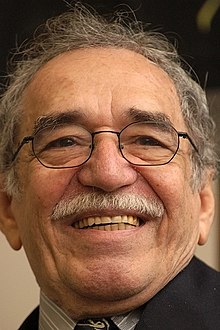 |
| Gabriel Garcia Marquez |
In his novel “One Hundred Years of Solitude”, G.G. Marquez makes an insightful revelation about cultural, social and political realities of the world which is difficult for the North American reader to fully recognize, understand and accept – so different it is from our world in many respects. This is the world of
 |
| Book Cover |
The
novel is the history of the founding, development, and death of a settlement
called Macondo, which is the setting of the novel, and of the most important
family in that town, the Buendias. At its foundation, Macondo exists in social
harmony, like early Eden ,
when the world “was so recent that many things lacked names, and in order to indicate
them it was necessary to point” (p. 11). After several civil wars and
revolutions, the town moves into complete destruction. The development of the
Buendia family symbolizes history of their country, in which people have no
rational control over their own destiny. Metaphorically, the family history is
the embodiment of the theme of solitude, fatalism and isolation, central to the
novel. It is so because the members of the Buendia family, with all their
vicious energy and intelligence, do not live their lives for the sake of their
own goals, but actually they live their lives in the name of someone else’s
values, Liberals, Conservatives, some other political parties that are unable
to change life in Macondo to the better. The members of the Buendia family are
isolated from historical reality by their inner withdrawal from it. As young
men, they are eager to fulfill their ambitions, but become frustrated and end
up withdrawing.
High literary quality of the novel comes from a very peculiar view of
history as farce which is too fantastic or too cruel to be true. Experiencing
history as fantasy is characteristic of magic realism of Marquez. The novel’s
purpose is to give the reader this same feeling of history that the characters
have: it seems that most of them sense that what is happening cannot really be
happening: wars, endless rains, plagues, insects, and all kinds of
disasters. Moreover, in a fantastic way
the family members tend to repeat the history of previous generations. Ursula,
the mother of the family, has the feeling that the world is repeating itself:
“It’s as if the world were repeating itself” (p. 276). The sense of this tragically ironic
repetition of events, combined with satirically precise characters creates the
unforgettable atmosphere of the novel and is one of the novel’s strengths.
For a sophisticated reader looking for existentially unforgettable
experience, the book’s rating is undoubtedly 10/10 stars. This reader will
fully appreciate the novel’s unprecedented historical setting, unexpected
characters and plot full of delightful incidents. This reader will fully
comprehend the book’s unforgettable magic reality, and the powerful atmosphere
of tragic irony of solitary existence in an isolated and historically marginal
place, such as Macondo.

